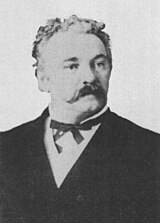Paul Neumann (Attorney General)
| Paul Neumann | |
|---|---|
 |
|
| Born | 1839 Prussia |
| Died | July 2, 1901 (aged 61–62) Honolulu |
| Occupation | Lawyer, politician, diplomat |
| Known for | Attorney general |
| Spouse(s) | Elisa |
| Children | 5 |
Paul Neumann (1839–July 2, 1901) was a lawyer, politician, and diplomat in California and the Kingdom of Hawaii.
Born in Prussia, Neumann became a lawyer in California around 1864 and served three terms as a state senator of California. He worked for fellow-German American Claus Spreckels (1828–1908), who maintained a monopoly of the refining of sugar from Hawaii in California. Neuman met Hawaiian royalty when they would come to California to be entertained by Spreckels. Neumann was the Republican Party of California's candidate for the United States House of Representatives in November 1882 for the San Francisco district. However, he was denounced by the San Francisco Chronicle as being a "sugar coated candidate", being used by Spreckels to advance his own interests, and was defeated in the election. In 1883, Neumann came to the Hawaiian Islands to serve as legal counsel for Spreckels who was now the publisher of the Honolulu Advertiser newspaper, first in the fall for a short visit. He was one of the first Jewish leaders in the Hawaiian Islands, although in later years he led a more secular life and did not raise his children in the Jewish faith.
Being from Europe, Neumann was comfortable around a monarchy, and made friends with the other Europeans in the islands.King David Kalākaua and other members of the government depended on loans from Spreckels to support their lifestyles. Within days of returning, Neumann was admitted to the bar and appointed as attorney general of the Kingdom of Hawaii, and a member of Kalākaua's Privy Council on December 14, 1883.Walter M. Gibson had been acting as attorney general, even though he had no legal training. The cabinet stayed intact until June 30, 1886, when another combination (except Gibson) was brought in, probably at the suggestion of Spreckels. Neumann was sometimes attacked by the conservative press for his "bohemianism", including playing Poker with the king, which the missionaries thought was sinful. He had been president of the Bohemian Club in San Francisco.Charles T. Gulick, although related to missionaries, also became a member of the Kalākaua cabinet as Minister of the Interior.
...
Wikipedia
